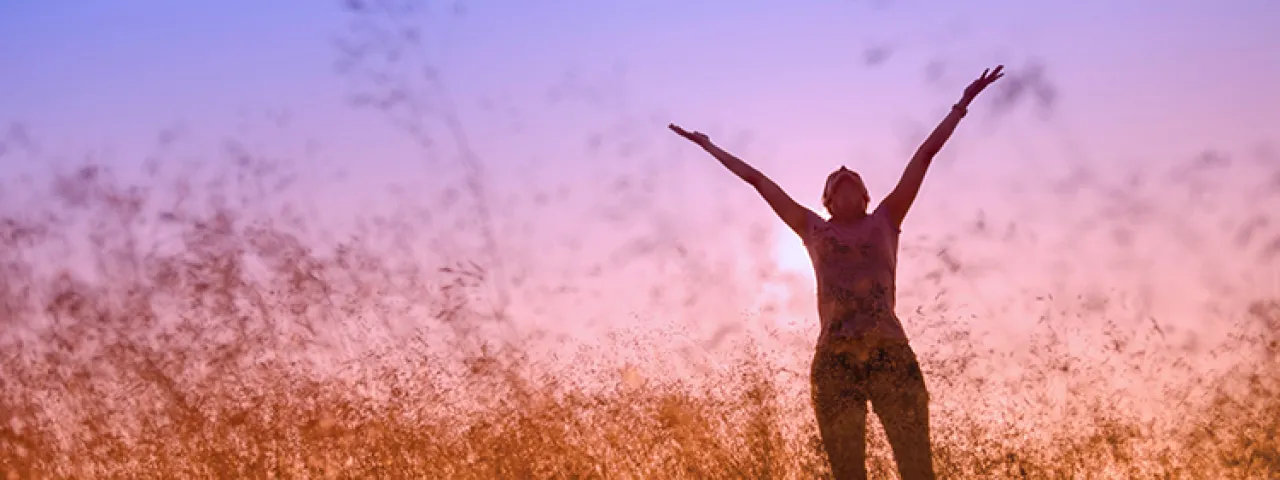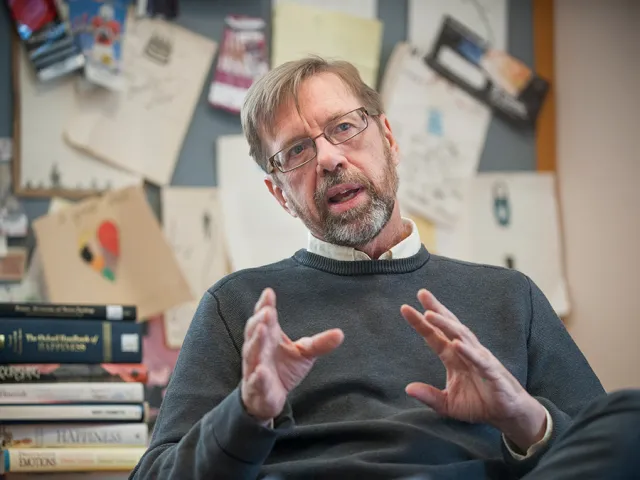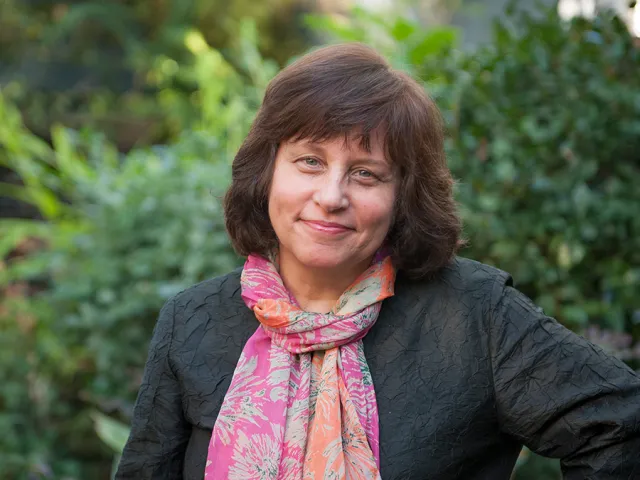What Is Gratitude?

The month for heightened gratitude—and the American holiday for which giving thanks is paramount—is upon us. New studies show that cultivating a feeling of gratitude when considering gifts and good fortune has been linked to better health and a general feeling of well being. But what is gratitude? Is gratitude an impulse hardwired in human nature? Is it a virtue or is it a practice? How does gratitude affect everything from the brain and the spirit, to the economy and the culture at large?
To get answers, Insight asked Smith professors from a range of disciplines to consider this question. What follows are their own essays describing how their scholarship informs the concept of gratitude.
About the Office
The ability to create is a gift. The builders of Chartres, though anonymous and long dead, give us a gift every day when we behold that magnificent structure, awed and transfixed by its impossible beauty. The same is true with the gifts handed down to us by the likes of Velasquez and Rembrandt, by Faulkner and McCarthy, by Whitman and Heaney.
I design and illustrate books—constructing tiny cathedrals, if you will, of paper, letters, words and pictures. It is work I do in relative solitude. Most days the only company I have in the studio is my gently snoring mastiff and the music of Bach and Palestrina.
But in my head, in my imagination, I am never alone. It’s like Goya seeing himself in The Sleep of Reason Produces Monsters. His dream, his imagination is haunted. Mine is, too—though not so much by bats and owls and panthers as by images that he, Dürer, Grünewald, Kollwitz, Whistler and others made and left behind. Images that continue to teach me and give me succor.
All my life I have studied my antecedents: painters, architects, printmakers, sculptors, poets, novelists, designers, illustrators, filmmakers, photographers and printers. Through the work of my spiritual ancestors, those gone on ahead and those yet alive, I have learned how to see, to think, to hear, to write and to discipline myself and my work.
The topic of gratitude does not readily bring to mind the field of physics. Poets, clerics and philosophers have undoubtedly written countless books on the subject, but what does gratitude have to do with the work of a Newton or an Einstein, pondering in solitude the motion of the planets or the rainbows of light cast by a prism?
In fact, however, gratitude is central to the culture of science, and the lone scientist uncovering the mysteries of the universe turns out, on closer examination, to be an oversimplified image at best. Newton famously said “If I have seen further [than others] it is by standing on the shoulders of giants,” and appropriately enough even this saying was apparently a paraphrase of several earlier authors. (Not all scientists have so thoroughly internalized the culture of gratitude; supposedly a modern particle physicist once quipped “If I have seen far it’s because I’ve been surrounded by dwarves.”)
All scientific work is built upon what went before. Theorists explain the results of experiments, experimentalists test the predictions of theorists, and all scientists attempt to replicate the work that preceded theirs. Even when a new theory overturns an old one, it does so by including and extending all of the ways in which the old theory had correctly predicted observed phenomena. Einstein’s theory of relativity replaced Newton’s conception of space and time with a more complicated one, but it would not have been possible to discover Einstein’s theory without Newton’s ideas as a starting framework. Our current theories of physics will almost certainly be overturned by a theory that explains the seeming contradictions in the models we know today, but the people who discover that new theory will only be able to do so after spending years carefully understanding the successes and limitations of the current theory.
In psychology, gratitude is an emotion we feel when taking account of gifts and good fortune. Gratitude is sometimes conveyed in acts, things we do to express our thankfulness. Acts of gratitude can be direct (saying thanks, prayers of thanksgiving) or indirect (giving back through service). While both contribute to well-being, the distinction between feeling grateful and acting grateful is consequential.
Although gratitude is linked to good fortune, it is not determined by wealth or privilege. In our research on digital storytelling for community engagement, people from the most challenged of circumstances tell stories about their lives. Those stories often involve confronting great hardship; yet they are infused with gratitude toward people, toward community and often toward the experience of hardship itself. Curiously, privilege can raise expectations, obscuring the appreciation for life’s simple gifts.

Phil Peake is a professor of psychology.
Visitors to the Smith College art museum shop may notice amid the crafts and curios for sale a basket of Mexican milagros—miniature votive charms in the shape of body parts, representing a thank-you for healing delivered or promised. Across the green, the Caverno Room in Neilson Library houses a collection of late Etruscan votive offerings: a terracotta head, a foot, an ear, each one a material token of gratitude much like the milagros. Gratitude, it seems, is a universal phenomenon, an impulse hardwired in human nature. To those of us who study religion it reveals a variety of aspects, endlessly fascinating and complex.
In one sense, gratitude is an affective state, a spontaneous emotional response toward anyone who has shown us a kindness. In another sense, gratitude is a virtue to be cultivated and a social skill to be learned—children must be taught to say thank you. In the world’s religions, gratitude is an obligation. Psalm 107, the great biblical hymn to gratitude, begins with the injunction to “Give thanks to the LORD, for He is good, for his mercy endures forever,” and then proceeds to list a host of occasions that call for a thanksgiving sacrifice: safe passage through the desert, deliverance from hunger, thirst, captivity, sickness, shipwreck, death. Just waking up in the morning is reason enough to give thanks, if one considers the alternative; hence the Jewish morning prayer, “I thank You, living and enduring God, for You have restored my life to me: great is Your faithfulness.”

Carol Zaleski is a professor of world religions.
Poetry is language used in full recognition of its layers of significance, in full awareness of its sensual properties as well as its senses. Poetry calls us to take words apart as well as to read them together, to taste them as we talk, to take them in as we breathe them out. Approached this way, many words are little poems. “Gratitude” is certainly one such word.
Many of the world’s gifts are ones we’d rather not receive: setbacks, challenges, frustrations, losses. Henry David Thoreau, from whom I have picked up this habit of etymological thinking, was as familiar as anyone with these gifts.
Say the word slowly. Hold it in your mouth so that you can feel each syllable’s weight on the tongue. The “grat” in “gratitude” is the “grate” in “grateful,” and both branch from the Latin root “gratus,” or “pleasing. This root also produces the flower of “grace.” In the Christian tradition I grew up in, that grace is the gift of divine presence, a gift freely given, one that can be neither earned nor refused. The “tude” here is the same one we find in “attitude,” itself an early Italian adaptation of the Latinate “aptitude.” The syllable takes a stance; it suggests a disposition and derives from a sense of fitness or appropriateness. The fruit produced by these roots and branches is a way of being in the world continually open to its gifts, a way of being in which the world—all that is and happens and is becoming—is a gift.
In responding to major disasters—locally, nationally and internationally—I work with people experiencing the most profound suffering and a labyrinth of losses. Their loved ones may have been taken away or tortured by soldiers; often they have lost everything. But I am always stunned and inspired by the strength and resiliency I witness.
More often than not, gratitude is at the core of this fortitude; gratitude is what can shift a tragic narrative to one of thankfulness and hope. A man with whom I worked in Haiti had experienced intense, destabilizing trauma after the 2010 earthquake killed his fiancée. Years later, he still writes to me expressing his gratitude at having survived. He explains that his family, friends and community came together to “hold” him as he grieved, cried and mourned his way to a reconstructed life and a resurrected sense of meaning. Today he honors and carries the memory of his fiancée forward through his work in social services helping other people. Similarly, psychiatrist, author and Holocaust-survivor Victor Frankl transmuted his unimaginable suffering in a Nazi death camp to explore the inextinguishable search for meaning that informed his life and still informs the many lives he has touched through his books.
Although a sense of gratitude is subjective, it engenders physiological changes as well. Meditators focusing on compassion (which is closely linked to gratitude) have shifts in brain activity as sites of fear and anxiety diminish and those fostering feelings of empathy, compassion and the desire to help others light up. Brainwave patterns shift, leading to a greater sense of wellbeing. The body secretes hormones, such as oxytocin which is associated with partners and deep friendships.